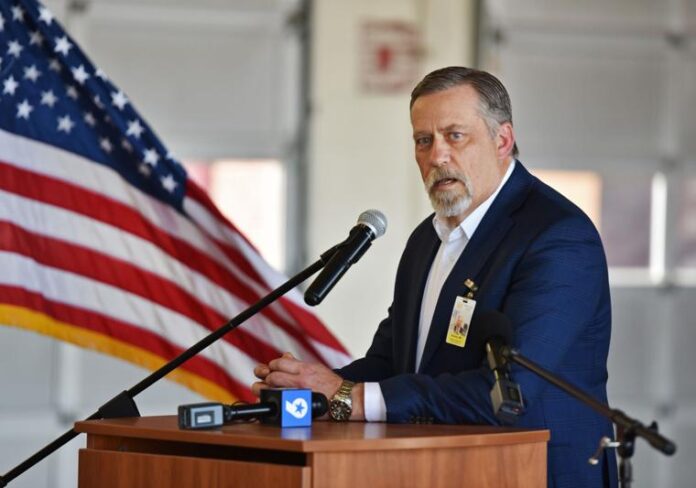As a way to provide access to affordable healthcare for the Permian Basin and surrounding communities, Texas Tech University Health Sciences Center and the Permian Strategic Partnership have joined forces to start Medicine on the Move.
The new mobile units will create an access point into primary care, mental health and chronic disease management for rural patients across the Basin by deploying telehealth technology to host a schedule of clinics, a news release said.
The announcement of the venture was made by Texas Tech University Health Sciences Center, PSP and The Caring Foundation of Texas recently.
The partnership and funding by PSP initially paved the way for the launch.
“This is an original adventure out of the Texas Tech University Health Sciences Center Permian Basin School of Medicine and within the School of Medicine here we have created a rural and community engagement unit, so that’s the division, if you will, within the School of Medicine that is launching this,” said Dr. Timothy Benton, regional dean of the School of Medicine.
It’s a partnership with PSP who they worked with to get assistance and funding, but one of the vans is partnered with The Caring Foundation of Texas, which is a part of Blue Cross Blue Shield of Texas.
“The other van, which you haven’t seen yet … will be a … Texas Tech Physicians van,” Benton said. “… We will equip it with telemedicine equipment and go out into community centers and offer basic primary care visits.”
The other van in partnership with The Caring Foundation will go to community centers, churches and school districts, or whoever requests it.
Benton said they will provide health screenings. They could focus on colon cancer screenings, provide breast cancer education screenings or conducting diabetes screenings.
He added that they can also deliver immunizations as part of the Texas Vaccines for Children program. Those vaccines are supplied by the state through the Department of State Health Services.
“The two of these together, they are meant to be points of access to care. We don’t necessarily intend for them to be a patient’s routine, daily clinic but a point to engage community patients where they are and perhaps reach people that have not been engaged with the healthcare system previously,” Benton said.
They could also partner regionally with existing practices and clinics.
“… It’s not just trying to stream those patients to Odessa; it’s a regional partnership,” Benton said.
He added that the intent is to go throughout the Permian Basin, although they don’t have an exact map yet. Plans are also to include Southeastern New Mexico.
Along with medical care, Benton said the idea is to engage with and build relationships with communities. It also is to meet people where they are and gather information to learn how they can better design healthcare delivery in the future.
“It fits within a broader movement from our rural and community engagement unit of population health,” Benton said.
Benton said he has always had an interest in community medicine, the newer term being population health.
“… But this is no stranger to a family medicine physician, which I am. Our foundation of family medicine was approaching people as a whole, not just as disease; approaching people from what was called the bio-psycho-social model and that we’re not just biology, but we are mental health. We also are social, or we live within communities, and all of those affect our health,” Benton said.
He said health starts in people’s homes and neighborhoods.
“… Health begins at home and so I’ve long desired to reach people before they get to the doctors office to affect their health. That line of thinking and moving outside of the clinic walls led to conversations among various members of my circle in the School of Medicine and then also conversations with the Permian Strategic Partnership. … Those conversations led to learning about The Caring Foundation and the model that they had already in place in other places and so that was sort of the origin of it (was) coming together and thinking about how to address healthcare needs …,” Benton said.
COVID showed that the medical community needed to think “bigger and broader” in public health. Benton said that term has “really migrated to what we call population health.”
“Population health is the merger of primary care with public health. Public health often would focus toward infectious disease processes, but health is broader than that. It’s chronic disease management, or preventive care, so primary care plus public health. The pandemic really just pointed out to us all that we need to think differently in how to meet the needs of the population,” Benton said.
One of the vans is stuck in the supply chain, he said, but they will start rolling the one they have. There is no regular schedule yet, but it will probably start soon, he added.
“The plan is to connect to community entities whether it be … charitable services, the food bank, if it be foster care related, churches, community clubs, community centers,” Benton said.
He added that it will be an interprofessional model that will reach across all of their schools.
“… There may be times when students or faculty from the School of Nursing, or students or faculty from the PA school and the School of Health Professions would be a part of it, or students and faculty from the School of Medicine and we are reaching even across … to other healthcare professional training institutions in the region. They could certainly jump on the band (wagon), too,” he said.
Benton said they will figure out where to go through the connections they make. They have many already, but they are building new ones, too.
“It’s getting to know people. We have partners that are talking with the food bank and foster care and churches and schools. The school district is a good partner in this; we’ve been talking to them,” he added.




